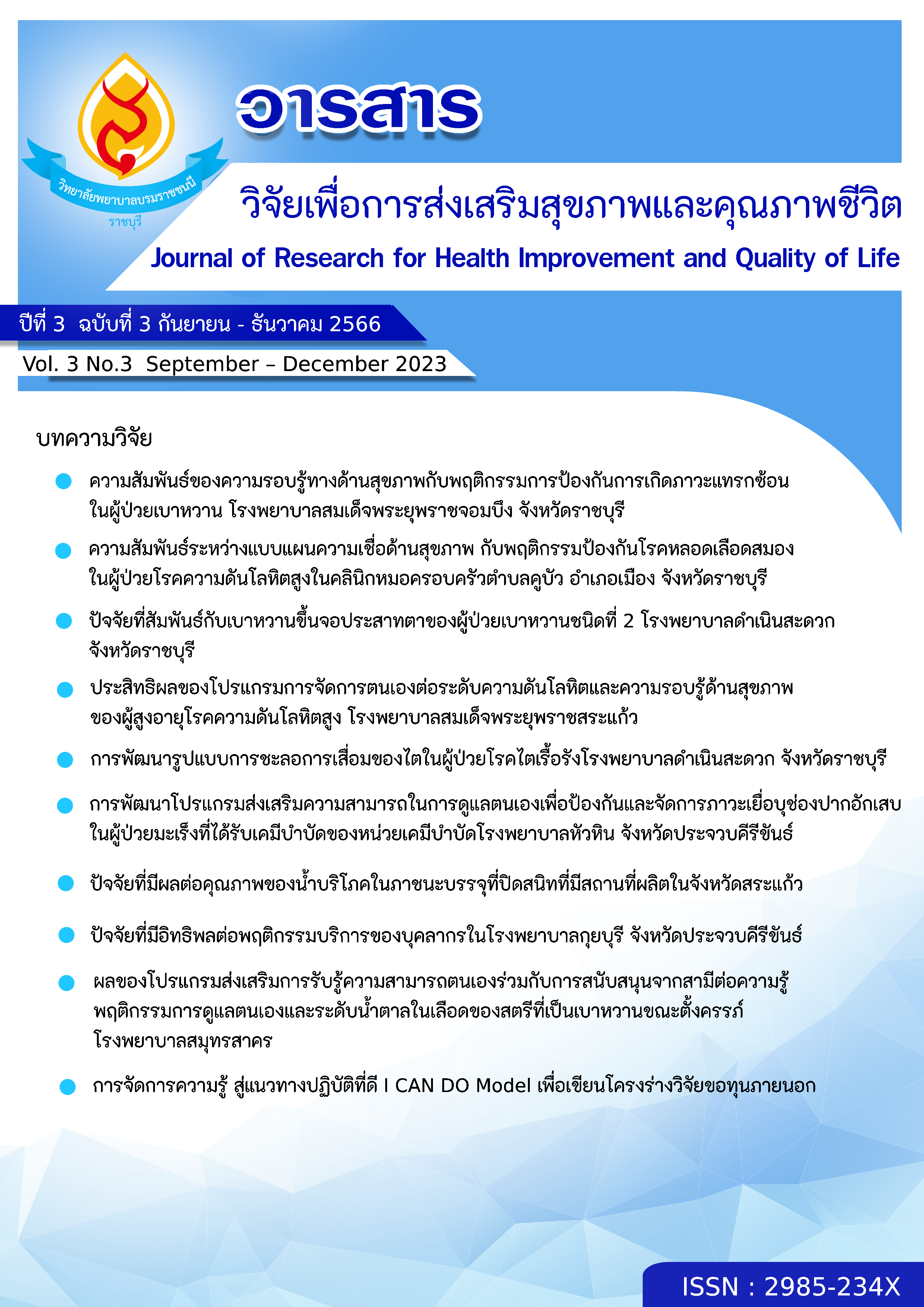ผลของโปรแกรมส่งเสริมการรับรู้ความสามารถตนเองร่วมกับการสนับสนุนจากสามีต่อความรู้ พฤติกรรมการดูแลตนเองและระดับน้ำตาลในเลือดของสตรีที่เป็นเบาหวานขณะตั้งครรภ์ โรงพยาบาลสมุทรสาคร
คำสำคัญ:
โปรแกรมส่งเสริมการรับรู้ความสามารถตนเอง, การสนับสนุนจากสามี, เบาหวานขณะตั้งครรภ์บทคัดย่อ
การวิจัยกึ่งทดลองนี้มีวัตถุประสงค์เพื่อ 1) เปรียบเทียบความรู้ภาวะเบาหวานขณะตั้งครรภ์พฤติกรรมการดูแลตนเองด้านการรับประทานอาหาร และการออกกำลังกายของกลุ่มทดลองและกลุ่มควบคุม และ 2) เปรียบเทียบระดับน้ำตาลในเลือดหลังอาหาร 2 ชั่วโมง ของกลุ่มทดลองและกลุ่มควบคุมก่อนและหลังการทดลอง กลุ่มตัวอย่างเป็นสตรีตั้งครรภ์ที่เป็นเบาหวานขณะตั้งครรภ์ชนิดเอ วัน แบ่งเป็น 2 กลุ่มๆ ละ 25 คน เครื่องมือวิจัยเป็นโปรแกรมส่งเสริมการรับรู้ความสามารถตนเองร่วมกับการสนับสนุนจากสามี และแบบสอบถาม แบ่งเป็น 4 ส่วน คือ แบบบันทึกข้อมูลส่วนบุคคลและระดับน้ำตาลในเลือด แบบวัดความรู้โรคเบาหวานขณะตั้งครรภ์แบบสอบถามพฤติกรรมการรับประทานอาหารและแบบสอบถามพฤติกรรมการออกกำลังกายความเที่ยง เท่ากับ 0.79, 0.82 และ 0.83 ตามลำดับ วิเคราะห์ข้อมูลโดยใช้สถิติเชิงพรรณนาและการทดสอบค่าที ผลการวิจัย พบว่า
- กลุ่มทดลองมีคะแนนเฉลี่ยความรู้พฤติกรรมดูแลตนเองด้านรับประทานอาหาร และออกกำลังกายสูงกว่าก่อนการทดลอง และสูงกว่ากลุ่มควบคุมอย่างมีนัยสำคัญทางสถิติ (p< .001)
- กลุ่มทดลองมีค่าเฉลี่ยน้ำตาลในเลือดหลังอาหาร 2 ชั่วโมง ต่ำกว่าก่อนทดลองและกลุ่มควบคุมอย่างมีนัยสำคัญทางสถิติ (p <.001)
โปรแกรมส่งเสริมการรับรู้ความสามารถตนเองร่วมกับการสนับสนุนจากสามี มีประสิทธิผล ทำให้สตรีที่เป็นเบาหวานขณะตั้งครรภ์เปลี่ยนแปลงพฤติกรรมดูแลตนเองด้านรับประทานอาหารและออกกำลังกายดีขึ้น และระดับน้ำตาลในเลือดหลังอาหาร 2 ชั่วโมง ลดลง
เอกสารอ้างอิง
Al-Hashmi, I., Hodge, F., Nandy, K., Thomas, E., & Brecht, M. L. (2018). The effect of a self-efficacy-enhancing intervention on perceived self-efficacy and actual adherence to healthy behaviours among women with gestational diabetes mellitus. Sultan Qaboos University Medical Journal, 18(4), e513-e519.
Ansarzadeh, S., Salehi, L., Mahmoodi, Z., & Mohammadbeigi, A. (2020). Factors affecting the quality of life in women with gestational diabetes mellitus: A path analysis model. Health and quality of life outcomes, 18, 1-9.
Best, J. W. (1977). Research in education. New Jersey: Prentice hall Inc.
Bloom, S. J. (1975). Taxonomy of education objective, hand book 1: cognitive domain. New York: David Mckay.
Bandura, A. (1997). Self-efficacy the exercise of control. New York: W.H. Freeman.
Chaengsawang, S., Siriaroonrat, S., & Techasuksri, T. (2020). Predicting factors for glycemic control behavior of women with gestational diabetes. Faculty of Nursing Journal Burapha University, 28(3), 79-89. (in Thai)
Cunningham, F. G., Leveno, K. J., Bloom, S. L., Spong, C. Y., Dashe, J. S., Hoffman, B. L. et al. (2018). Williams obstetrics (25th edition). New york: McGraw-Hill.
Faul, F., Erdfelder, E., Buchner, A., & Lang, A. G. (2009). Statistical power analyses using G*Power 3.1: Tests for correlation and regression analyses. Behavior Research Methods, 41(4), 1149-1160.
Ghaderi, M., Farahani, M. A., Balouchi, A., & Haghani, H. (2022). The effect of smartphone - based education on self-efficacy of women with gestational diabetes: A controlled clinical trial. Romanian Journal of Military Medicine, 125(2), 330-337.
House, J. S. (1981). Work stress and social support (addison-wesley series on occupational stress). Boston: Addison-Wesley Educational Publishers Inc.
International Diabetes Federation. (2019). IDF Diabetes atlas. 8thedition. Brussels, Belgium: International Diabetes Federation.
Jittrapirom, A., & Chareonsanti, J. (2015). Effectiveness of education provision and relaxation training program on self-care behaviors, blood sugar levels and stress among gestational diabetic women. Nursing Journal, 42(4), 133-145. (in Thai)
Netimetee, S., & Boobpamala, S. (2022). Nursing care for pregnant women with gestational diabetes mellitus during pregnancy. Journal of Health and Nursing Education, 28(1), 1-14. (in Thai)
Panyaso, K., Sangin, S., & Chuahorm, U. (2020). Factors associated with health-related quality of Life among pregnant women with diabetes mellitus in public hospitals, upper northern region Thailand. The Journal of Faculty of Nursing Burapha University. 28(3), 27-40. (in Thai)
Pingwong, K., & Sittipa, K. (2023). Factors related to self-management behaviors among pregnant women at risk of gestational diabetes mellitus. Journal of Nursing, Chiang Mai University, 49(1), 217-328. (in Thai)
Phothi, P., Teerakulchai, J., Kanbordee, C., & Panburana, P. (2016). Effects of a resistance exercise program on glycemic control in pregnant women with lactation. Diabetes mellitus type A. Day. Vajirasarn Nursing Journal, 18(2), 13-24. (in Thai)
Phonyiam, R., & Wattananukulkiat, S. (2016). Effects of a belief-based methodical education program on health behaviors of pregnant women with risk factors for diabetes during pregnancy. The Journal of Baromarajonani College of Nusing, Nakhonratchasima, 22(1), 77-92.(in Thai)
Rueangchainikom, W. (2013). Diabetes and pregnancy in Yuen Tannirandon, Worapong Phupong, and Ekachai Kova-Wissarat (Editors). Medicine, mother and fetus (3rd edition). Bangkok: Royal College of Obstetrics and Gynecology of Thailand. (in Thai)
Suwanpakdee, W., Youngvanichset, S., & Chunual, S. (2018). Effects of a self-competency promotion program on diet and exercise behaviors of diabetic pregnant women. Journal of the Southern College of Nursing and Public Health Network, 6(1), 39-50. (in Thai)
Vanichphongphan, V, Rasamecharoen, K, & Lertbananapong, T. (2017). Textbook of obstetrics. Bangkok: P.A. Leaving. (in Thai)
Yang, Y., Lin, Q., Quan, P., Wen, Y., Li, X., & Lin, J. (2020). Study on the effect of web-based real -time interactive intervention teaching model on self-efficacy of gestational diabetes mellitus patients. International Journal of Clinical Medicine, 11(12), 778-785.
ดาวน์โหลด
เผยแพร่แล้ว
ฉบับ
ประเภทบทความ
สัญญาอนุญาต
ลิขสิทธิ์ (c) 2023 วิทยาลัยพยาบาลบรมราชชนนี ราชบุรี

อนุญาตภายใต้เงื่อนไข Creative Commons Attribution-NonCommercial-NoDerivatives 4.0 International License.
บทความทีตีพิมพ์ในวารสารนี้ถือว่าเป็นลิขสิทธิ์ของวิทยาลัยพยาบาลบรมราชชนนี ราชบุรี และผลงานวิชาการหรือวิจัยของคณะผู้เขียน ไม่ใช่ความคิดเห็นของบรรณาธิการหรือผู้จัดทํา




